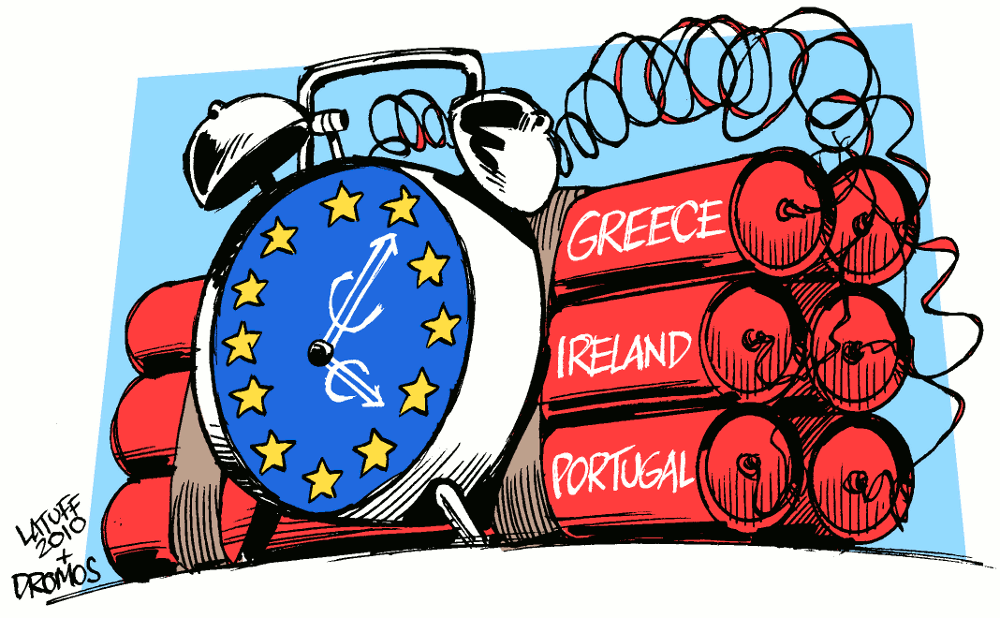The Irish Times reports that as soon as the result of the referendum on the treaty appeared to be in the bag, Enda Kenny was on the phone to Angela Merkel presumably for a pat on the head as he reported on the completion of his mission. However, an Taoiseach and to a much greater extent Eamon Gilmore should be concerned about the concentration of No votes in the working class areas of Dublin and the border areas in the North West.
There is an old proverb which says “Be careful what you wish for, because it might come true”. In the context of the biggest crisis in the history of world capitalism, arguing in favour of a treaty which ties the state to a permanent austerity programme will sooner or later back fire in the face of the government. But before then it will massively expose the failure of the labour leadership to carry out their promise to defend the Irish working class from the worst impact of the Fine Gael austerity programme.
The bourgeois press in Ireland was rolled out to pressurise workers into voting for the treaty, but it would be wrong to assume that the vote is a passport for the coalition to implement more cuts and austerity. The campain against the household taxes demonstrates the difficulty that they will face.
Doubtless Eamon Gilmore would argue that the Irish economy will resolve the problem of austerity on the basis of growth. But under the current conditions, that optimism, which is based on the fact that Ireland exports 80% of what it produces, seems utterly misplaced.
Why is that? Very simply Europe stands on the edge of an abyss. The fiscal treaty won’t stop Greece defaulting and dragging Europe further into recession. It won’t stop the flight of money, neither from the Spanish banks nor the Greek banks. But by tying all of the states to the principle of balanced budgets or budget surpluses on pain of not being able to access bailout funds, the treaty merely provides a mechanism and an excuse to attack working people.
That means permanent austerity, which would cut the European market, which is already in recession. The Irish government might take comfort in the fact that the economy exports 80% of its production, but that means that the state is very vulnerable to fluctuations in world trade. While exports rose by 8% in 2011, GDP growth remained almost flat. If GDP remains flat or falls on the back of a further crisis in Europe that will inevitably impact on trade, which will place still further burdens on the Irish banks and on the state finances.
The next two or three weeks are likely to see a fair amount of scurrying about on behalf of Michael Noonan, Enda Kenny and Eamon Gilmore. Certainly they will anxious to try and exchange their Yes vote in the referendum for a deal on the bailout interest rate. But that is likely to be overshadowed by the run up to the Greek elections, the Spanish banking crisis and the generally gloomy outlook in the rest of the eurozone and in Britain.
One thing is for sure. The grave structural crisis in the world and particularly the European economy is not going to go away. Trotsky once observed that: “Each measure to which capitalism is constrained in order to make a step forward in restoring equilibrium, each and all of this immediately acquires a decisive significance for the social equilibrium, tends more and more to undermine it, and ever more powerfully impels the working class to struggle.” Leon Trotsky - Report on the World Economic Crisis and the New Tasks of the Communist International – 1921
These words, which were written in the context of the years immediately following the first world war sum up the situation in Europe very well, and in Ireland more so. The strictures attached by the Troika to the 2010 bail out have already placed a great burden on the working class as the government tries to impose the so called reforms in the public sector which were the flipside of the Croke Park Deal.
The Fiscal Treaty merely ratchets up the pressure, not only the public sector workers, but on the old, the unemployed, the sick and the young. Sooner or later these measures will create a backlash from working people. Already €14,000 for every single person in the state has contributed to the bailout of the banks. Enough is enough.
- No to austerity
- No household taxes
- Break the coalition
- Fight for socialist policies
